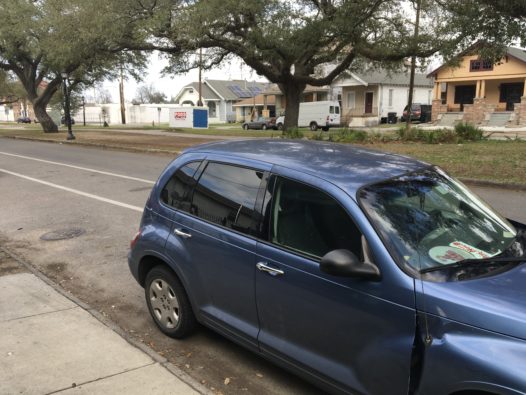About a year ago, my roommate Paul barged into our house on St. Roch Avenue. He was pissed. That evening marked the third time that someone—teenage thugs? seasoned thieves? disgruntled hipsters?—had vandalized his blue PT Cruiser. The problem was bigger than a busted car. One minute, he complained, it was the guy stalking towards you on a shadowy street. The next it was the weather bookies who predicted when storms would swallow the city, or the rising cost of living, or the sirens screaming down Claiborne Avenue. He smiled sadly and said, “They should call this place The Big Gamble.”
I thanked Paul for coining such a silly nickname and, laughing, told him that I was stealing it.

St. Roch Avenue (photo by Ben Saxton)
From the moment when Jean-Baptiste Le Moyne de Bienville settled on a swamp in 1718, New Orleans has had a lengthy romance with chance. Perched precariously on the Mississippi, the city wasn’t only an ideal hub for commerce; it was also vulnerable to flooding, hurricanes, and disease-infested mosquitoes and snakes. By 1868 another snake—The Louisiana Lottery Company, also known as “the Serpent”—slithered into the state and brought massive wealth and corruption. The people, weary of lotto fever, vanquished the Serpent in 1892. But the chance-taking impulse, like Gulf Coast waters, ebbs and flows. One century later, governor Edwin Edwards rammed a controversial casino bill through the 1992 state legislature, resulting in one land-based casino, Harrah’s New Orleans; fifteen riverboat casinos on lakes and rivers; thousands of video poker machines inside bars, restaurants, and truck stops; and a statewide lottery. Legalized gambling, it seems, is here to stay.
Laissez le bon temps rouler. Right?
I moved here a few years ago and often wonder about taking chances. These days you might find me gambling—literally—inside Harrah’s casino, where I’m researching a book about poker in New Orleans (poker, like jazz, was invented here and has pre-American roots). Playing cards has taught me that gambling is never only about gambling: it’s about different ways of being in the world. Buying a lotto ticket, saving for groceries, betting big on a job or a relationship or a surgery—many decisions are less about money or morals than about attitudes towards luck. Do things happen for a reason? Do we control our fate? How do we even make decisions? These questions pester us, whether we like it or not. Our answers reveal character.
This series will include conversations with artists, musicians, educators, academics, housewives, doctors, pastors, gamblers, and others who, for all kinds of reasons, are risking life in New Orleans. For some of us, risk implies loss or catastrophe—the Bad Things that happen when you live on the “wrong” street, when you send your kid to the “wrong” school, when you believe in the “wrong” God. For others, risk breeds hope. As some of my poker-playing friends like to say: “No gamble, no future.”
I’ll be starting close to home, in St. Roch, by talking with a few folks from the neighborhood. After that, we’ll see. Please don’t hesitate to reach out with comments or suggestions! I’m only an email away.
 NOLAbeings Multimedia artist Claire Bangser created NOLAbeings as a portrait-based story project that marries...
NOLAbeings Multimedia artist Claire Bangser created NOLAbeings as a portrait-based story project that marries...  Voodoo in New Orleans: Reviving history: New Orleans fortune telling This article takes a deep dive into the history of Voodoo in New Orleans, its hybridization with Catholicism, and its present-day place in the city's culture. The author visits fortune-tellers in the French Quarter, using their guidance as a tool for introspection rather than a deterministic predictor of the future. Through her experiences in New Orleans, the author feels a mystical connection to both the past and the future.
Voodoo in New Orleans: Reviving history: New Orleans fortune telling This article takes a deep dive into the history of Voodoo in New Orleans, its hybridization with Catholicism, and its present-day place in the city's culture. The author visits fortune-tellers in the French Quarter, using their guidance as a tool for introspection rather than a deterministic predictor of the future. Through her experiences in New Orleans, the author feels a mystical connection to both the past and the future. 
Hello everyone from GambleZoid! We are happy to share our expertise and help you find the best online casinos. You can also get the scoop on the site. Stay tuned for the latest news, exclusive bonuses and valuable tips on responsible gaming. We encourage you to ask questions and share your thoughts—your feedback is always welcome!